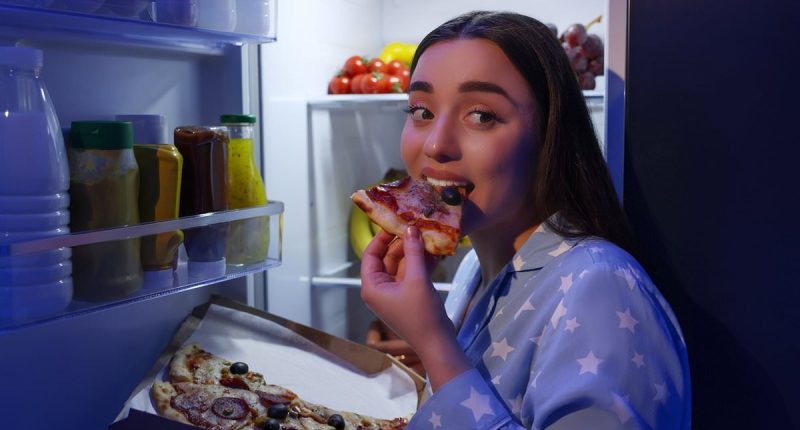Share this @internewscast.com
Many people will admit to having peered into the fridge in the dead of night, hunting for a snack.
But those who do so regularly may be suffering from a little-known eating disorder with potentially serious health risks, research has shown.
Called night eating syndrome, it’s believed to affect between 1 and 4.6 per cent of people.
While it’s normal to feel peckish now and then, those with the condition often consume more than a quarter of their recommended daily calories after their evening meal – or wake up specifically to eat, often more than once a night.
And sufferers may also feel a compulsion to eat – believing that falling back to sleep without food to be impossible.
Morning appetite tends to be low or non-existent, too, and anxiety, stress or low self-esteem are common side effects – particularly in the evening.
Night-time snacking is associated with an increased risk of obesity, diabetes and mental health problems, and fresh data suggests it may be far more common than once thought.
Dentists last month warned that millions of Britons are damaging their teeth by bingeing on sugary treats after dinner.

Night eating syndrome is believed to affect between 1 and 4.6 per cent of people, and can lead to chronic health conditions, including cardiovascular disease and diabetes (file image)
As many as one in three adults snack every night, a survey by the Oral Health Foundation found, with more than two in three opting for chocolates, sweets and biscuits.
In response, The Mail on Sunday’s GP columnist Dr Ellie Cannon discussed the habit in her weekly column. She asked readers to divulge their night-eating experiences – and was flooded with emails and letters.
One 65-year-old man said his late snacking began with a glass of apple juice but he was soon tucking into plates of leftovers, cheese, ham, fruit and nuts as many as three times every night.
And an 83-year-old woman said she has to have a slice of Battenberg cake at 3am with a glass of cold milk to get her back to sleep. Another woman also wrote about how marmalade toast is the only thing that can alleviate her night-time hunger, explaining: ‘I know it’s not healthy, but it’s become a habit. I love marmalade sandwiches.’
Sleep specialist Dr Neil Stanley warns: ‘It’s not going to kill you, in and of itself, but night eating syndrome can lead to poor sleep quality and chronic health conditions, including cardiovascular disease and diabetes.
‘A late-night slice of toast and cup of tea every so often is one thing, but if you’re not able to eat breakfast in the morning, are struggling through the day and not feeling your best physically, you need to get it sorted.’
A clear cause for night eating syndrome has yet to be found, but a collection of factors can trigger it.
‘It’s considered to be both a sleep and an eating issue,’ adds Dr Stanley.
‘It’s been linked to stress and mood disorders such as depression and anxiety as well as hormonal imbalances.’
This can occur when hunger and satiety hormones are imbalanced, says diabetes expert Professor David Strain.
During sleep, the body’s hunger hormone, ghrelin, tends to decrease while our satiety hormone, leptin, increases. However, in patients with night eating syndrome, the body can be jolted awake if the two become confused.
‘It may be because the body is insensitive to the satiety hormone or just not producing enough of it,’ says Professor Strain, ‘but regularly eating overnight can… produce a load of chemicals when the body is trying to sleep.’
Some studies suggest eating at night can begin as a form of comfort for those already dealing with mood disorders and sleep problems.

Meike Leonard learned that night eaters are more likely to experience negative health effects due to weight gain, hormonal imbalance and poor sleep. They should ask a doctor for advice
A 2022 study by US researchers found that adolescents with depression, high levels of stress and insomnia are at a much higher risk of developing the condition.
‘The difficulty is that it becomes a self-fulfilling cycle,’ Dr Stanley explains. ‘Research has shown that, when we’re tired, we reach for fatty and sugary foods. Eating a diet high in these foods has been shown to further disrupt sleep.’
And waking up at night to snack can do more than just make you exhausted – night eaters are more likely to be obese, suffer heart disease, strokes and type 2 diabetes due to weight gain, hormonal imbalance and poor sleep quality.
Ask your doctor for advice if you think you suffer from night eating syndrome, says Dr Stanley.
Treatments can be similar to those for insomnia, such as cognitive behavioural therapy and medications that help you sleep through the night.
But experts claim one drug shows particular promise in treating the condition: Ozempic.
For Daniel Gerrard, the chief executive of UKAT addiction treatment centres, it was the weight-loss jab that finally cured his 17-year struggle with night eating syndrome.
Prescribed the jab for his diabetes, the 55-year-old says it curbed his late-night sugar cravings almost immediately. ‘I can’t remember the last time I woke up to snack,’ he adds.
















